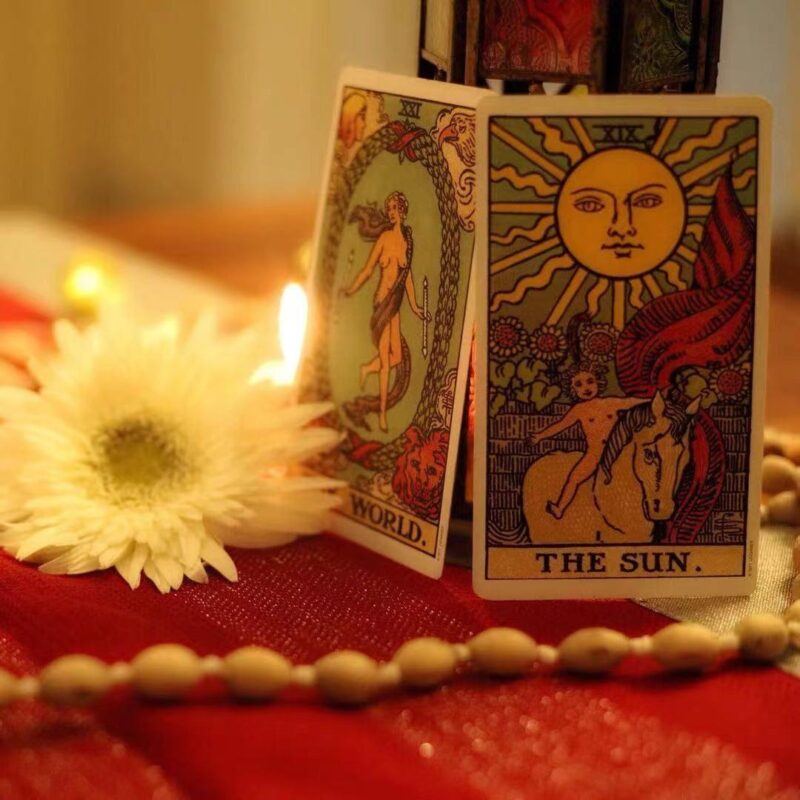Tarot cards have long captivated individuals with their enigmatic symbols and profound insights. Beyond their mystical allure, tarot cards also hold a fascinating connection to psychology. In this article, we will delve into the intriguing realm of the mysterious psychology of tarot cards, exploring how they can provide profound insights into the human psyche, facilitate self-discovery, and promote personal growth.

- Archetypes and the Collective Unconscious:
One of the key aspects of tarot cards’ psychological significance lies in their representation of archetypes. Carl Jung, the renowned psychologist, introduced the concept of archetypes and the collective unconscious. Tarot cards, with their rich symbolism and imagery, tap into these universal patterns of the collective human experience. Each card embodies archetypal energies and personalities that resonate with our subconscious minds, offering a profound mirror to our inner world. - Symbolic Language and the Unconscious Mind:
Tarot cards communicate through a symbolic language that bypasses the conscious mind and directly connects with the unconscious. The images, colors, and patterns on the cards evoke emotional responses and activate intuitive insights. By engaging with tarot cards, individuals can access their unconscious minds, revealing hidden desires, fears, and motivations that influence their thoughts and actions. - Self-Reflection and Personal Growth:
Tarot cards serve as powerful tools for self-reflection and personal growth. When individuals engage in tarot card readings, they are encouraged to explore their thoughts, emotions, and experiences in relation to the cards’ symbolism. This introspective process fosters self-awareness, allowing individuals to gain deeper insights into their strengths, weaknesses, and areas for personal development. - Integration of Shadow Self:
The concept of the shadow self, another psychological concept introduced by Carl Jung, refers to the unconscious aspects of our personality that we often repress or deny. Tarot cards can help individuals confront and integrate their shadow selves by bringing to light those aspects that need acknowledgment and acceptance. Through this process, individuals can achieve a greater sense of wholeness and psychological well-being. - Therapeutic Applications of Tarot:
Tarot cards have found their way into therapeutic settings as powerful tools for introspection and healing. Tarot readings can facilitate dialogue between therapists and clients, providing a visual and symbolic framework to explore emotions, challenges, and potential solutions. The cards’ imagery and interpretations can spark discussions that lead to profound insights and therapeutic breakthroughs. - Synchronicity and Meaning-Making:
Synchronicity, a concept also associated with Jungian psychology, refers to meaningful coincidences that occur in our lives. Tarot cards, as instruments of synchronicity, can reveal connections and patterns between seemingly unrelated events or experiences. By interpreting the cards’ messages and reflecting on their significance, individuals can create personal narratives and make meaning out of their life experiences. - Intuition and Psychic Abilities:
Engaging with tarot cards can enhance individuals’ intuitive abilities and psychic sensitivities. As individuals practice tarot card readings, they develop their capacity to trust their intuition, listen to their inner voice, and tap into their psychic insights. This process strengthens their connection to their subconscious minds and expands their awareness of the subtle energies surrounding them.
The mysterious psychology of tarot cards offers a profound avenue for self-exploration, personal growth, and psychological insight. Through their archetypal symbolism, connection to the collective unconscious, and therapeutic applications, tarot cards provide a rich tapestry for individuals to navigate the depths of their psyche. By embracing the mysterious psychology of tarot, individuals can embark on a transformative journey of self-discovery, gaining profound insights into their inner world and unlocking their full potential.
